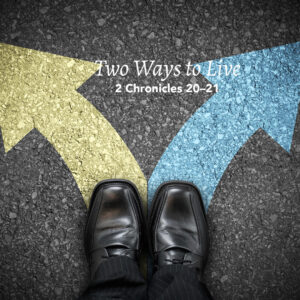2 Chronicles 20-21: Two Ways to Live
July 20, 2024
TODAY'S BIBLE READING:
2 Chronicles 20-21, Psalm 145, Luke 11:37-54, 2 Thessalonians 2:1-5

Jehoshaphat continues to show his godly wisdom. When faced with insurmountable problems (20:1-2) and naturally afraid, he “set his face to seek the LORD” (20:3). When we come across circumstances, enemies, situations or problems that we cannot solve or seem to rise above, our first recourse is to seek God. Jehoshaphat proclaimed a fast (20:3). This seeking of God was not merely to be his individual seeking, but a general calling upon God which he led the people to do. They together sought and cried out to God for rescue.
Jehoshaphat’s prayer is recorded for us (20:5-12)—and it is well that it is. He appeals to God’s power (20:6), his covenant promise (20:7), and his honor (20:9). Then he lays the case straightforwardly before God (not thinking that he will be heard for his many ways), simply saying in their own strength they do not have the ability to withstand this attack and therefore need his help (20:12). He finishes with a remarkable sentence: “We do not know what to do, but our eyes are upon you” (20:12). What an example! When we do not know what to do, where do we look? Do we look to the Internet? Do we google a search term for an answer? Do we first go to friends? Do we look at our bank balance? God can use research and friends and resources, but above all and through all, our eyes are to be on God. We look to him. We ask him for his assistance. Without that, we have nothing.
And as the people gather, the Spirit of God moves in Jahaziel, a Levite, who then prophesies God’s answer to their prayer: “Do not be afraid and do not be dismayed at this great horde, for the battle is not yours but God’s” (20:15). How often do we need to hear this word! Do not be afraid, Moses. Do not be afraid, Joshua. Do not be afraid, David. Do not be afraid, Jehoshaphat. The battle belongs to God. He goes out before. It is his name and his glory and his promise that is at stake. This is God’s battle. Stand and see the salvation of God (20:17).
The response is equally remarkable: they praise God (20:18-19). Remember, they have not yet seen God do anything, but they trust his word and praise God for his answer to their prayers. Once we have received anew God’s promises, the burden is gone and we are free once more to rejoice in God’s goodness.
Jehoshaphat leads the people: “Believe in the Lord your God” (20:20), and once again, they sing the covenant song: “Give thanks to the LORD, for his steadfast love endures forever” (20:21; see 1 Chron. 16:34). And God rescues them (20:22). He brings division and infighting and the enemies kill themselves (20:23). A house divided against itself cannot stand (Mark 3:25). It is often God’s way to cause his people’s enemies to fight amongst themselves—“behold, there were dead bodies lying on the ground; none had escaped” (20:24). It is true that the “high places” were not removed (20:33), a serious omission, but otherwise, Jehoshaphat goes down in history as a great and godly king. Why? Because he feared God.
Jehoram (chapter 21) was quite otherwise. He killed all his brothers with the sword (21:4). Lack of fearing God leads to fearing people which leads to paranoia and (in this instance) to vicious violence. It is not religion which is the cause of the wars in the world; it is perverted humanity, sometimes taking the guise of false religion, sometimes of no religion.
Jehoram allies with Israel (21:6). Despite this, he cannot defeat Edom (21:8-10). He receives a letter from Elijah telling him exactly what was the problem (21:12-15)—but this does not cause him to repent. When you receive, even in writing as perhaps a final warning, this kind of missive from a godly man or woman, make sure you repent before it is too late. Enemies are stirred up against him, and he dies of a horrible incurable disease (21:16-20; cf. Deuteronomy 28:58-59).
A godly king. And a godless king. Two ways to live. Which will you choose?
ABOUT THE AUTHOR
Josh Moody (Ph.D., University of Cambridge) is the senior pastor of College Church in Wheaton, IL., president and founder of God Centered Life Ministries, and author of several books including How the Bible Can Change Your Life and John 1-12 For You.
WANT MORE?
To receive God Centered Life devotionals directly in your inbox, as well as other resources, enter your email address in the form at the bottom of this page and click "subscribe."

